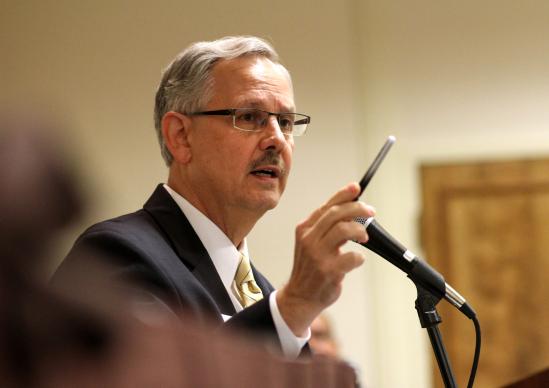
Bishop count could be reduced in two U.S. jurisdictions
From United Methodist News Service, Nashville, TN, and Dakotas Conference UM Communications
The General Council on Finance and Administration (GCFA) notified the North Central and Northeastern Jurisdictional leadership that the number of bishops representing the areas could be reduced based on reported membership numbers. GCFA, responding to responsibilities and membership formulas outlined in ¶ 404.2 of the Book of Discipline, and the responsibilities of GCFA for the administration of the Episcopal Fund that pays the salaries of bishops, notified the College of Bishops of each jurisdiction that the formula indicates there could be a reduction in the number of bishops from their current count.
In response, Bishop John Hopkins, president of the North Central Jurisdiction (NCJ) College of Bishops said, “The news that NCJ professing membership dropped .36% under the threshold (or 4,463 professing members) was unexpected, as earlier projections had indicated that this would probably not happen for another year or two. Our College of Bishops and our Committee on Episcopacy ask for your prayers as we consider options in the few months before our General and Jurisdictional Conferences.”
Meanwhile, Maggie Jackson, who chairs the NCJ Committee on Episcopacy, said, “This is a short time span to have this discussion about the possibility of one less bishop for the election process in NCJ for 2016. We will need to have immediate consultation with committee members and the NCJ College of Bishops.”
 In response to this news, Dakotas-Minnesota Area Bishop Bruce R. Ough said that the continued decline in membership across the North Central Jurisdiction is not inevitable, as evidenced by the growing vitality of more and more congregations across the Dakotas-Minnesota Area and many other parts of the jurisdiction. “Membership has been, in the past, a typical measure of our effectiveness in reaching new people in the past,” he said. “Worship attendance, baptism, professions of faith, and missional outreach are better indicators of our current effectiveness in growing capacity to love God and neighbor, reach new people, and heal a broken world. I rejoice in the growing impact our congregations are having on transforming individuals, families, communities, and the world. We are on a Journey Toward Vitality that will ultimately move us from decline, scarcity and retreat, to growth, generosity and expansion.” Photo by Kathleen Barry, UMNS
In response to this news, Dakotas-Minnesota Area Bishop Bruce R. Ough said that the continued decline in membership across the North Central Jurisdiction is not inevitable, as evidenced by the growing vitality of more and more congregations across the Dakotas-Minnesota Area and many other parts of the jurisdiction. “Membership has been, in the past, a typical measure of our effectiveness in reaching new people in the past,” he said. “Worship attendance, baptism, professions of faith, and missional outreach are better indicators of our current effectiveness in growing capacity to love God and neighbor, reach new people, and heal a broken world. I rejoice in the growing impact our congregations are having on transforming individuals, families, communities, and the world. We are on a Journey Toward Vitality that will ultimately move us from decline, scarcity and retreat, to growth, generosity and expansion.” Photo by Kathleen Barry, UMNS
Meanwhile, Bishop Sandra Steiner Ball, President of the Northeastern Jurisdiction (NEJ) College of Bishops said, “The Northeastern Jurisdiction has been making important progress toward making disciples of Jesus Christ for the transformation of the world. The Northeastern Jurisdiction as a region of the world is distinctively diverse, in the midst of deep cultural and religious change and is complex. As a region within the United States, it is home to four of the top ten metropolitan areas. The College of Bishops has spent significant time in prayer, study, and conversation about the future of The United Methodist Church in the Northeastern section of the United States. For missional and congregational vitality reasons, the College of Bishops is concerned about any reduction in the number of episcopal areas. As we approach 2016, the College will continue conversation and collaboration with the Northeastern Jurisdictional Committee on Episcopacy. Together we will work toward action that leads, energizes, and engages disciple making efforts which build hope, trust, and relationships that glorify God and lead people to Christ.”
Additionally, Bonnie I. Marden, Chair of the NEJ Committee on Episcopacy said, “We have noted that several questions about changes to the Constitution initiated by the 2012 General Conference are adding further complexity to our understanding of the appropriate next steps and we welcome your prayers as we discern options for a vital and mission-driven future.”
Bishop Michael Coyner, president of GCFA, said that while this information is not brand new to us as a denomination, it is particularly important for the jurisdictions being affected to be notified in a timely fashion. “Vibrant mission and ministry continue to happen throughout our connection and for that we are thankful,” he said. “We know that the decisions that will be made will be based on the needs in each area for strong, prophetic leadership.”
The Book of Discipline 2012 provides for the reduction of bishops based on reported membership. GCFA reports that the 2014 reported membership for both jurisdictions has fallen below the Book of Discipline requirement for membership that would require nine bishops. GCFA will ask for the decision of the General Conference—the body that can make the final decision on the number of bishops for each area based on information from GCFA and input from the Interjurisdictional Committee on Episcopacy.